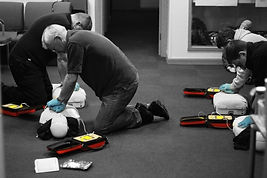
EDUCATION AND TRAINING
Why Choose Our First Aid Training?
At Rutland Medical Solutions, we believe first aid training should be more than just ticking a compliance box—it should prepare people to act confidently and effectively when it matters most.
All our courses are regularly reviewed to ensure they meet the latest guidance from the European Resuscitation Council, the British Thoracic Society, and the Health and Safety Executive. We are also in the process of becoming a registered QUALSAFE Centre, enabling us to deliver fully accredited courses.
Paramedic Led Training
As a CQC-registered medical provider, we set exceptionally high standards for our own clinical team. Our staff are expected to follow the newest evidence-based practices, maintain in-depth clinical knowledge, and confidently use a wide range of medical equipment. We believe your First Aiders deserve the same level of expertise from their trainers.
That’s why every course is delivered by practising healthcare professionals—clinicians who work on the frontline and bring real-world experience into the classroom.
Realistic, Hands-On Learning
Our training packages include immersive simulation exercises using professional moulage and scenario-based setups. This approach bridges the gap between theory and practice, helping learners build the confidence and competence needed to handle real emergencies.
Participants consistently tell us how valuable these realistic scenarios are, and many companies return to us year after year because of the quality and authenticity of our training.
Courses That We Can Offer
We have a selection of courses that we can offer to you or your organisation to ensure you or your staff are as fully prepared as possible. We have detailed below what each course covers, who it is suitable for and the duration of this course.
If you need any more information or wish to proceed with booking us to deliver a bespoke training course for your workplace, please click on the contact us button.
Our most popular courses are ran regularly enabling individuals to book their space online.

















.jpg)
